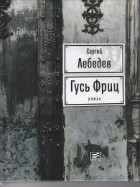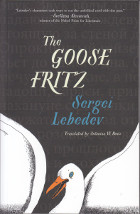Sergei Lebedev
The Children of Kronos
Proposal
Rights acquired by
- Vremya, Moscow
- S.Fischer, Germany
- New Vessel, USA
- Claroscuro, Poland
Any person is a child of his era and those preceding it. Sometimes the past, including his distant family background or the depths of his country’s history, gains greater dominion over him than the present. After all, much in our lives is predetermined by a larger picture of history, and its circumstances, sometimes absolutely unpredictable, even incidental.
These questions are bothering Kirill, the main character of Sergey Lebedev’s latest novel largely building on the story of the author’s own family. This time, Lebedev, instead of guiding us through the GULAG camps, or offering an insight into the murky 1990s in Russia, goes back further into history, into the 18th century. Back then, Empress Catherine the Great, born Sophie Friederike Auguste von Anhalt-Zerbst, followed the example of Peter the Great and encouraged foreigners to work in Russia, especially Germans who, as she believed, could teach the Russians how to maintain order, spread European knowledge in different areas, and make the locals worthy of her educated highness.
Grandma would often take little Kirill to the German Cemetery in Moscow. It was shortly before her death, however, that she revealed to him their family secret, admitting to being of German descent, with Karolina Schwerdt as her real name. Her confession revealed a mix of pride, pain over losses, fear, and hope to reclaim memories of her loved ones through her grandchild, at least. All of a sudden, Kirill has a historical biography and a host of deceased ancestors, a belated return of an orphan to the house of his forebears of sorts. Russian and Soviet history has willed only one representative of the large family of Russian Schwerdts to survive on earth.
In a way, “The Children of Cronos” is a novel-requiem polemicizing with Gone with the Wind, inquiring whether it is possible to write a book while the wind of history has obliterated absolutely everything, and there is no surviving hero, but only lives cut short and vanishing without a trace, only fear testifying to the past, and only a list of things and people lost.
The latest novel by Lebedev is not a typical family saga. The author reveals, “To me, the very fact that everything ‘German’ sank into oblivion in the Soviet period is an excellent metaphor for total loss of identity, coerced human disembodiment, and depriving the human being of his historical dimensions and depth.” But how can someone oblivious of his ancestry be respectful of his history and himself?
Together with the author, we retrace the path of his ancestors and leaf through many previously unknown pages of the history of the Russian state. We familiarize ourselves with the likes of stories of tyranny, unprecedented cruelty and, at the same time, submission to fate, these qualities defining the course of Russian history to this day, the history of a country of paradoxes where life may do an about-face overnight, yet nothing may change for centuries.
The first Schwerdt to cross the Russian border in 1830 was Balthasar, son of the surgeon and obstetrician in the Zerbst Court. In defiance of his father’s plans, he took up homeopathy and, like the Apostol, decided to convert Russia to this new medical creed, to gain the attention and trust of the Royal Court, and to find and supply new healing substances accessible and affordable for all. However, he fell prey to the machinations of Prince Uryatinsky, an exiled petty tyrant and short-term favorite of Catherine the Great. The prince amassed his wealth recruiting Germans, both farmers and artisans, to settle in the Russian Empire, also supplying midgets, hunchbacks from Africa, exotic indigenes, and magicians to entertain the empress. In his old age, he was plagued by various diseases and dwindling masculinity, so Balthasar was ordered to turn back the clock and restore the prince his youth and virility. Balthasar spent seven years seeking the elixir of immortality for the senile old man. After two failed escape attempts, he was put under the supervision of an ex penal colony inmate, impaled, and forcedly married to a young German governess. The German doctor was rumored to have a hand in the subsequent death of the prince.
Balthasar was not alone in his exodus to the Promised Land; he was accompanied by his younger brother Andreas, thirteen years of age at that time. After having graduated from the Sea Cadet Corps as midshipman, Andreas was assigned to a circumnavigation mission, during which the crew was attacked by the inhabitants of one of the Pacific islands, and Andreas was taken captive. Talks of Salted Midshipman, whose headless cannibal-ravaged remains were placed in a barrel with salt and sent home, started circulating among sailors shortly thereafter. A younger brother, still barely an adolescent, was slaughtered like a sacrificial lamb…
Returning to Germany proved impossible for Balthasar, and his remaining years were dedicated to atoning for this sin, which is why he spent the rest of his live working as a low-wage physician in the Widows’ House in Moscow. “The Apostle Balthasar devoted himself to his children, in a way becoming a graphomaniac of fate, wasting his talent on his meek wife, though it was initially intended for miracles and great feats; still, he seemed to be striving for elbow room to encompass certain uncharted territories…” History, however, is merciless toward missionaries, as though causing their blind faith in a dubious and yet appealing idea to ricochet and using it to revenge itself on their descendants.
All of his eight daughters were married, but dark clouds appeared to be looming over them and their descendants. The elegant Anna-Sophia married a wealthy landlord, converted to Orthodox Christianity, and died in 1914 after having learned that the only son of her only daughter had died in the Battle of Gunbinnen against the German army. Charlotte and her husband, a medical doctor, dies at the hands of rebels in the Khanate of Kokand. Frederica moved to Warsaw together with her husband, a music teacher, having been out of touch with her family since 1915 when German troops entered the city. Agnes, together with her spouse, an Interior Ministry official, was killed by SR (Socialist Revolutionaries) bombers. The emancipated Ulrika drowned on her way back from New York, when the liner Lusitania sank, but not before the same force of nature, water, did away with her sons in the Battle of Jutland, known as the Jutland Massacre. That time, the Seydlitz battlecruiser, with her son from the first marriage as an artilleryman abroad, destroyed HMS Queen Mary, killing her son from the second marriage, who happened to be a crew member. Fate seemed to be sending bad omens and killing Balthasar’s children and grandchildren, this way signaling that this country [Russia] had no joy and happiness for them.
The only person among Balthasar’s descendants to be spared by fate was his only son, Andreas, named after his late uncle. Fully committed to engineering (the likes of bridges, dams, and locks), he could have become a most brilliant engineer had it not been for the blizzard, a classical Russian literary theme. His train wound up stuck in the middle of an open field, with the passengers hitting the panic button, no heat, and rapidly vanishing food supply. This is when Andreas gave a good account of himself as an excellent organizer. His actions were closely observed by steel magnate Gustav Schmidt who happened to be traveling in the company of his daughter. Even if it was a true love, it cost Andreas dearly—he was no longer his own master, being transformed into the idea generator for his father-in-law’s business, whose only dream was getting his share of lucrative military procurement. Iron Gustav, as he was known within his close circle, was a control freak who pushed his weight around, deciding the fate of his daughters at will, and that of his only grandson, Arseniy, an heir presumptive to grandfather’s business empire.
As a child, however, Arseniy frequented the family estate where his grandfather Balthasar spend the last years of his life, and where Arseniy, enchanted by the peculiar lab containers, healing powders, and Latin books, fell in love with medicine. After having graduated from the Imperial Military Medical Academy in Saint Petersburg, he treated peasants and soldiers. As an epidemiologist, he was dispatched to the 1904-1905 Russo-Japanese War where he witnessed hundreds, even thousands of soldiers go insane. Men previously accustomed to charges, hand-to-hand combat, and close firearms encounters, were paralyzed in the face of a new industry of death, with its long range artillery, landmines, machine guns, and repeating rifles, weapons of mass destruction obliterating entire platoons in a matter of seconds.
Gustav and Andreas were making a fortune, profiting from warfare by striking military procurement contracts. At his grandfather’s quaint estate, however, Arseniy was helping those who were about to start a revolution. To Arseniy, the socialist idea seemed the very cure-all his grandfather sought in homeopathy. So he treated revolutionaries and helped them evade persecutions. One such patient was a Revolutionary known by the name of Aristarchus, one of the underground leaders of the 1905 December uprising in Moscow.
There exists historical inevitability, and that is exactly what Lebedev’s novel exposes, with its series of armed conflicts, including the Russo-Japanese, First World, and Civil Wars, also the bloody Revolution. It tells us that there is no justification for a capitalist feeding carrion to his workers or, equally, for a peasant pitchforking his former landlord. There are times in history when there is no right or wrong, when everyone is engrossed in insanity. “The history of Russia from the 1905 Revolution to the 1917 Revolution reeked of rotting meat as though the decaying body of the empire were giving off its stench; as though social life had decomposed and turned into something repugnant, indigestible, and inedible, with everyone smelling its foul odor in the air.”
Iron Gustav finally gained access to the tight circle of top armament manufacturers, but the First World War broke out and while the insanity of soldiers during the Russo-Japanese conflict had seemed more or less harmless, now total madness became a norm with fertile soil to sustain itself. Propaganda blamed Russia’s defeat [at the hands of the Japanese] on traitors at home, Germans, seeking to do away with Russia. Shortly thereafter, the Ministry of Interior decreed all citizens of German descent between 18 and 54 years of age to be exiled, followed by other regulations depriving them of their properties and rights in Russia. Although Gustav and Andreas realize that they must run, they are bound to their wealth. And where could they run? In Germany and Austria-Hungary, they are considered Russian, while the Triple Entente member states see them as Germans. In the meantime, a wave of bloody ethnic cleansing flooded the cities of Russia. “Without considering the spy-mania in the final years of the empire, it is impossible to explain why people degenerated so easily to the level of snitching on one another… Emergency meetings, special commissions, indiscriminate repressions, the machinery of state oppression—the Bolsheviks did not invent anything new.”
Even his friendship with the Minister of War could not save Gustav, not even his attempts to produce Salted Midshipman out of his barrel as evidence of his loyal service to Russia. After Gustav’s death, Andreas started sponsoring the revolutionaries, though his contribution was not limited to money, it seems. As the October 1917 coup unfolded, the deafening noise of cannons and rifles manufactured by him and Gustav filled the air around their home on Krasnaya Presnya Street. A desperate Andreas met with Aristarchus, his son’s patient and a Cheka bigshot at that time, from whom he received a protection certificate vouching for the Schwerdts as revolutionary sympathizers. Nonetheless, Andreas was eventually killed by marauders in his home.
Unlike writers testifying in their books as witnesses, Lebedev’s novel carries no pathos, as it does not spring from utopian soil. Interference from “larger” history and “new order” has devastated many families, taking away people’s personal freedom and individual choice, and reaffirmed the truthfulness of the proverb “dog eat dog.” Correspondence with the German Schwerdts ceased at some point during the First World War. History, in its sarcastic way, willed for the Schwerdts to fight on opposite sides, brother against brother.
The [Russian] Civil War caught Arseniy’s family by surprise. To save his household, he joined the Red Army. Working in a hospital in a small provincial town, he saw Bolsheviks leave people high and dry and execute protesting peasants, which must have opened his eyes to the true identity of his masters. His wife was looking after her bedridden mother, with their six children temporarily sent off to relatives in different cities. Similar to many tsarist officers, Arseniy may have considered fleeing abroad, but the country succumbed to anarchy so rapidly that was unable to put his children together in one place. He almost did one time, but his youngest son, Mikhail, was stuck in Tsaritsyn, a city that repeatedly changed hands, from the Reds [Red Army] to the Whites [White Army], back and forth. At the time, the date was the main feature on theater posters, as it marked the switchover from the Julian calendar to the Gregorian one, and back. People seemed to be reliving the same nightmare all over again, traveling from the future back to the past and from the past to the future. Moreover, this very absence of reliance on time as the foundation of existence seemed to project some kind of sophisticated sadism that “downsized human beings into sand grains and condoning all cruelty.”
Arseniy’s encounter with the squadron of White General Mamontov stepped up his complete disillusionment. They seemed to be from a distant past, from a nomadic horde, dressed in stolen women’s fur coats and carrying saddlebags packed with pearl-embellished golden covers ripped from icons, “like the Mongols assaulting the ancient cities of Old Russia. The Horsemen of Russian Apocalypse.” Later, great-grandfather Arseniy frequently traveled to Tsaritsyn, or Stalingrad since 1925, where he learned that the family, who had sheltered Mikhail, were executed as early as 1918, and the child vanished without a trace.
This historical novel by Lebedev, at some point in the process of reading, transforms into an adventure piece, a disturbing fairy tale. Amid cataclysmic historical events, the lawless triumph of “novel principles”, “the dominion of the phrase”, the revolutionary psychosis, and the savagery of the Reds and the Whites alike, the Schwerdts attempt to come together, live their own life but, as they say, you can’t unring a bell.
Arseniy proved tough, which saw him through two wars, protected from bullets and blades, only to lead him, inevitably, down into the torture chamber in the infamous year 1937. Thanks to protection from Comrade Aristarchus, Arseniy carried on working as an army doctor, but that until Aristarchus himself was executed in the basement of Lubyanka [KGB headquarters] and Arseniy followed suit as “a German spy.” Kirill retrieved his case file that clearly demonstrated how rapidly Arseniy’s handwriting changed over six weeks of interrogation and beating. Today, an enormous flowerbed, without a gravestone or even a plaque, is found over the place in the territory of the Donskoy Monastery, where the ashes of those executed at Lubyanka and then cremated were dumped. A grave of unidentified remains.
Of the three daughters of Arseniy, only Carolina survived, while the other two, along with his granddaughters, perished during the Siege of Leningrad. Perhaps, some of them could have survived if it were not for their German last name, Schwerdt, which evoked hatred and further diminished their poor chances of getting some help.
Both sons, Gleb and Boris, became Red Army commanders. Boris took his Russian wife’s last name and renounced his arrested father. During the war [Second World War], Gleb, who was captured by Germans and recruited as an interpreter, consented to switching sides and fighting for the Fascists: “I have a burning desire to avenge my father who was killed by the Bolsheviks.” The Germans, however, believing him to be a Soviet spy, executed him. As Gleb’s treason became known, his brother, Boris, was arrested and executed. Gleb was put to death by Germans for being a Russian agent, and Boris by Russians as a German spy.
Grandmother Carolina, the only surviving child of Arseniy, spent her whole life holding back her family background. She married a man she did not love, who did not love her either, an officer for the trophy army detachment and an antiquarian exporting works of art from Germany for party and army bigwigs. She, “a has been” and a token of times past, became another object in his collection of antiquities, serving as a perfect setting for his museum items. In return, he guaranteed her security. Carolina, the last of the Schwerdts, was an editor, yet another brilliant metaphor in the novel—besides texts, she corrected herself and her family history.
Kirill, anxious about Mikhail’s fate after his disappearance in Tsaritsyn, travels to Tsaritsyn–Stalingrad–Volgograd, a city marking a turning point in the Second World War and still having a long memory of fierce battles. A city where shells continue to explode here and there under a thin layer of soil. A city-text where soldiers in bunkers wrote their final messages in charcoal or their own blood and stored them in tin cans, bottles, or pharmacy containers. A city on bones where, with the first signs of warmth in the spring of 1943, bodies were placed in basements, later to be walled up and turned into catacombs. A certain German bank decided to open its branch in this city and examined one of its mansions to this end. The opening of the basement, however, revealed ironclad chests full of papers with the same bank’s logo, which paid the salary of Paulus’ Sixth Army. Nearby, a telephone was discovered on the table, an imaginary direct line with the netherworld.
Kirill finally “got through” to Mikhail who had died only a few years earlier, known as Colonel Vladilen (a portmanteau blending Vladimir and Lenin) Ivanov, a military brat, and a Hero of Stalingrad. His official oil portrait displayed a man combining the features of his great-grandfather Arseniy, Andreas, and Iron Gustav. He, a man without a family or a biography, became a perfect Soviet person who never parted with his party membership card. “A quintessential lab sample unaware of its fateful heritage.”
Correspondence with the German Schwerdts ended during the First World War, so Kirill decided to locate his relatives in Germany, which he eventually did. The relatives keep a family archive in the attic, one like he inherited from grandma Carolina, with its letters, newspaper clippings, certificates, photos, postcards, and school report cards, everything that could be saved from the Soviet troops advancing westward, toward the occupation zone of Soviet allies.
As chance would have it, the news of Kirill’s discovery reached Dieter, the middle brother of Balthasar and Andreas, who invited Kirill to visit him at a retirement home in Berlin. “A different Vladilen materialized in front of Kirill. God must have willed for him to live two lives: one of Nazi priest Dieter Schwerdt and the other of Communist officer Vladilen Ivanov.”
Schwerdts would wind on different sides all too often! Dieter’s father, Richard Schwerdt, was part of an expedition corps fighting against the Herero and Nama tribes in Namibia. At that time, the Knyaz Suvorov battleship, with army doctor Arseniy Schwerdt on board, docked in a nearby port before setting out to engage in the fateful Battle of Tsushima. Dieter, who was a chaplain himself, was taken captive near Stalingrad and, after losing his arm, served NKVD Lieutenant Kibovsky for a slice of salo (cured fatback) as thin as cigarette paper. In exchange for the mystery of confession, he was protected from being assigned to a suicide mission. This was followed by yet another twist of fate, this time at home, when Dieter met with Kibovsky in East Germany to be recruited as an informer for the Stasi. “There is no God, but there is somewhere on the second floor, one Colonel Kibovsky reading your profile. History is Colonel Kibovsky, my boy,” Dieter says in closing.
Lebedev’s novel convinces you that the history of the USSR is a pack of falsifications and a collection of unreal lives, with millions of psychologically traumatized people produced by self-censorship and imposed silence, but “larger” history does not teach anything either, as people remain too blind to see through emerging evil. Especially striking among the many stories in the novel is one of Admiral Rozhdestvenski’s squadron, to which army doctor Arseniy was assigned, was moored by Namibian shore, a few miles away from Shark Island where the Germans had set up a camp for the from the Herero tribe, the first concentration camp in the 20t century. Several thousands of people died of exhaustion on the bare rocks of this island encircled by sharks. The brown uniform of the African expedition corps would later be adopted by SA. “They saw evil but never saw it for what it was,” Kirill murmurs to himself in awe, “they saw evil in its infancy, just making its first steps, still immature, and they failed to uproot it.”
Lebedev’s work is both a novel and a historical study, an analysis of cultural images and “memory” as a product of culture and propaganda. Given the myriad of lives, eras, cities, years, events, and passions found in this novel, it is truly epic. Amid the murky times facing Russia today, Lebedev succeeds in composing a text vying with “War and Peace” and “Doctor Zhivago” in terms of philosophical concept and the scope of material.
This novel is about the image of the foe shaping in public consciousness, gradually maturing and materializing, about people becoming hostage to their own identity, about nationality turning into an omen plaguing generations of families. It is about people with double, split lives sandwiched between the millstones of two dictatorships. Last but not least, it is a book about the role of fateful heritage in human lives, and about individuality striving to break free from ancestral predetermination.
The book’s brilliant language and captivating plot grab readers from page one, carrying them away and further down the biographical path of one family forever bound to the biography of Russia.



